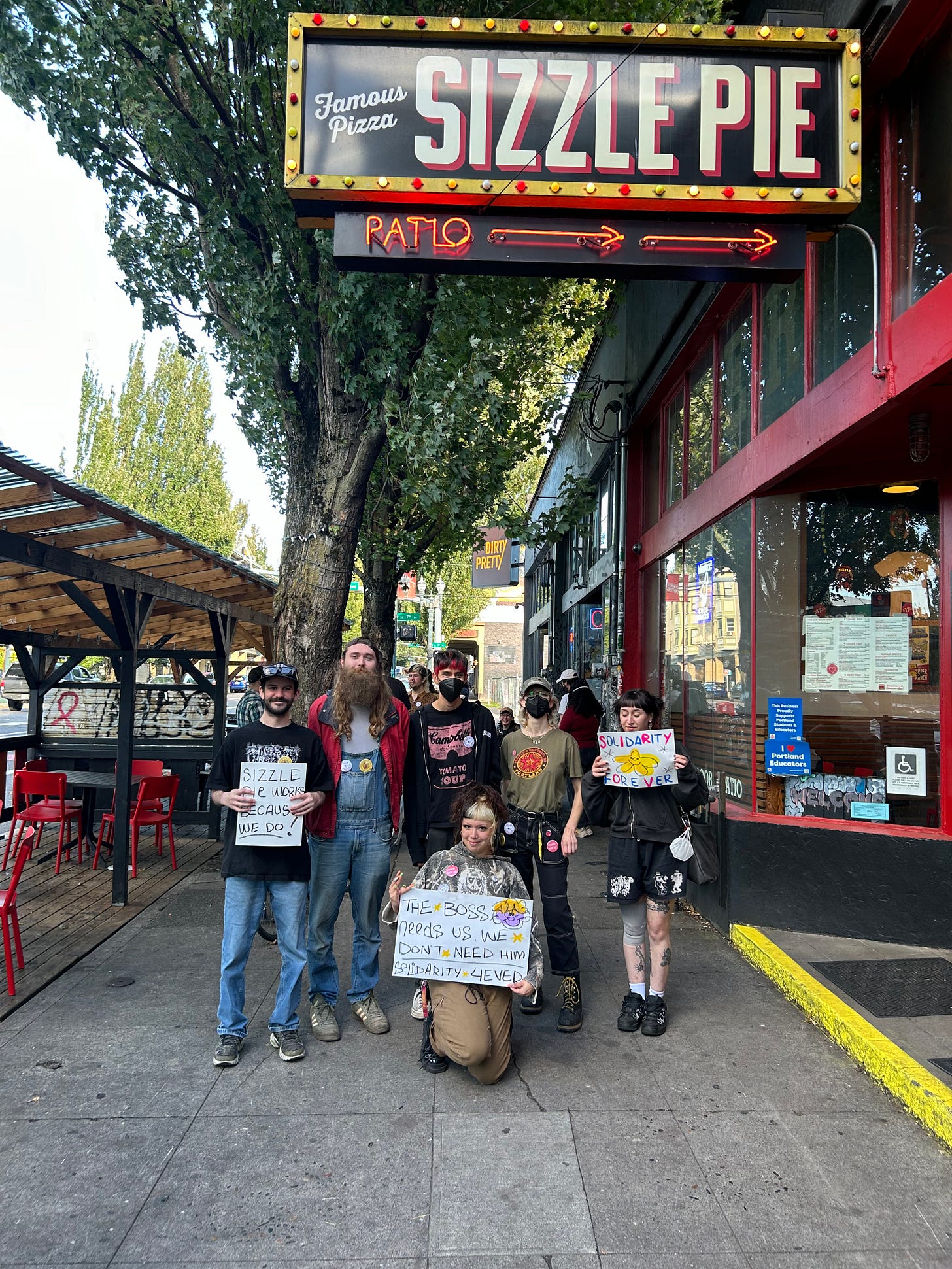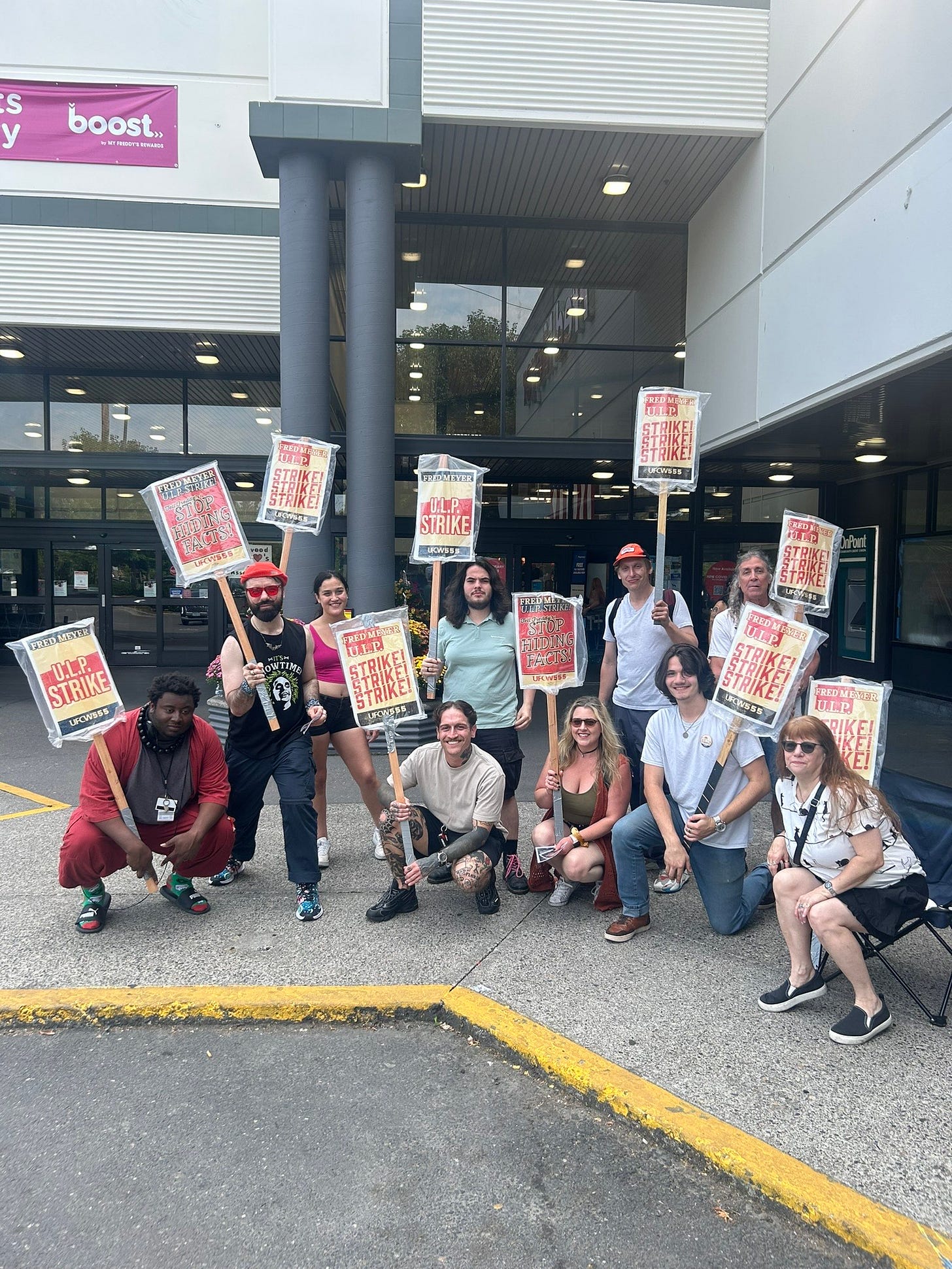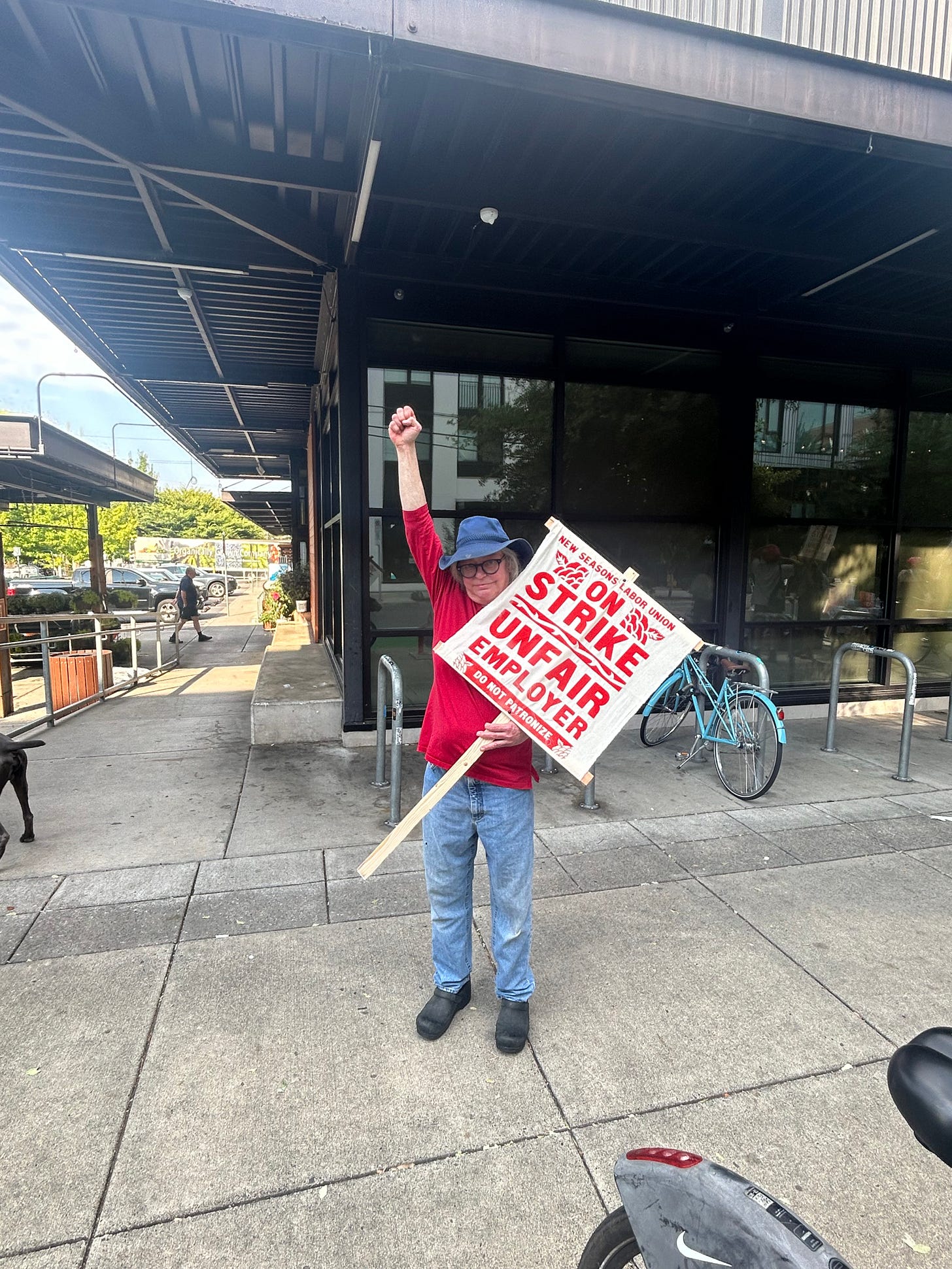
September has been a hot month for Northwest restaurant owners, and it’s not because they are performatively coming into the kitchen pretending to expo orders and wipe already clean dishes. A slew of workers across the Northwest hospitality industry have turned up the heat, either announcing plans to unionize or organizing actions to directly change their workplace.
Let’s be real from the jump. Private sector union rates in the United States are nothing short of anemic.1 And despite a generally more positive public sentiment towards unions of late (70% approval, a fifty year high), this has not stopped the downward trend of union membership in the private sector from manufacturing job loss attrition and Right-to-Work legislation. The data gets even more grim when looking at the hospitality and food service industry. It’s an industry the US Department of Labor has deemed one of the fastest growing in the country, and where a lot of the post-pandemic and post-recession job creation has come. The issue? These jobs simply are not very good, and the unionization rate is among the lowest across all of the private sector at 1.4%.
The hospitality industry has long been inhospitable towards workers from low pay often only slightly offset by tipped income, hostile workplace culture where boss harassment is normalized to be almost seen as virtuous, to ongoing safety violations from old/broken equipment, massive superspreader sites for workers during the pandemic, and a culture of limited to no sick leave (despite serving people food).
There are huge barriers to organizing with high turnover, small workforces, and erratic profit margins. Some may say this calls for an entirely different, more cross industry based organizing approach to unionism. But given the unionism framework we have and the relatively limited political power of restaurant workers in this given moment, I’d like to highlight some recent stories of workers aiming to change this by building lasting power right now.
Sizzle Pie Joins Restaurant Workers United
Just before the Friday night dinner rush on September 27, workers rallied outside the East Burnside Sizzle Pie to announce they were joining the independent Restaurant Workers United, who represent hospitality workers in Seattle and Austin. While seven workers took turns at the megaphone outside the shop, inside the restaurant all but one seething manager sported RWU buttons while working at the pizza oven and counter.
“We are organizing because we know what we deserve, and we've experienced far better times with the company than we are having now,” said Kremer Snelson, a Sizzle Pie cook who started with the company in 2019. “Sizzle Pie is a Portland staple. We want to see the company survive, and the owners have the opportunity to change course from running the brand into the ground.”
This union effort comes in the wake of numerous shocking articles covering Sortis Holdings’ egregious financial scandals. Sortis is a private equity firm that has come to purchase a slew of Portland based chains like Water Avenue Coffee, Rudy’s Barbershop, Bamboo Sushi, and more fine dining establishments in Submarine Hospitality.2 However their checks and rent payments have been bouncing around town, some shops have unexpectedly closed, and the stock equity they paid to former owners is a fraction of what it was once worth.
“We just want stability and to be respected as workers. We are the people who are keeping Sizzle Pie open through this. It's hard going into work not knowing if we're going to lose our jobs the next day,” expressed Ava Meisel, another Sizzle Pie worker.
The private equity firm bought Sizzle Pie in 2022 at first promising expansion of the business. However, after opening a location in Beaverton more never came to fruition as conditions in their existing stores deteriorated, eventually closing restaurants in Eugene and Reno. Last November, with only ten days notice Sortis announced that they would be ending their in house delivery service and laying off drivers in favor of third party delivery apps. A trend in line with the company’s goal to keep labor costs down. Or perhaps more accurately put by workers in the shop, to make understaffed kitchens take on more work with less pay.
“They said inhouse delivery was an ‘unsustainable operating cost,’” said Victoria Clark, a delivery driver since 2021 who was able to get a new job in front of house, albeit at a pay cut without delivery tips. “Sortis was certainly behind the decision. They didn’t realize much of the work [drivers] did was irreplaceable, we also did expo, cleaning, and dishwashing when we weren’t delivering food. They just see numbers on a spreadsheet and think, let’s cut that, then workers scramble to fix the mess afterwards.”
The union election date has not yet been set for Sizzle Pie workers after filing their petition with the NLRB on September 20.
Fried Egg I’m On Strike
Earlier this summer workers at the Portland chain of brunch restaurants Fried Egg I’m in Love decided the cure to pay inequity and a lack of a progressive discipline policy3 was to unionize with the Portland IWW and newly formed Coalition of Independent Unions. The Fried Egg Workers Union (FEWU) began bargaining with management in September after overwhelmingly winning their certification election across four locations.
In their first bargaining sessions the union reported winning some agreements from the employer to back off on previously announced pay and hour reductions for some workers. However a key disagreement remained around the company’s disciplinary policy, and workers walked out on strike at the Hawthorne location during the Saturday brunch rush on September 21. Management eventually opted to close entirely with all the workers on the picket lines singing a union remix to “Hot to Go.”
“We staged a walkout strike at the Hawthorne location in protest against their mistreatment of this employee and the indiscriminate firing and targeting of union members since we went public in May,” said Wesley Belknap, a FEWU rep and delivery driver from the commissary kitchen. “[We’re going] back to the bargaining table next week, presenting additional articles to build up the framework of our contract, and ideally come to an agreement on progressive disciplinary tactics. Our employer has not responded directly to the strike, but FEWU members have noticed surveillance tactics and targeting behavior has increased from management since.”
Belknap is excited about the union’s momentum and hopes it can continue a trend to organize in food hospitality alongside union siblings in the Burgerville Workers Union, who helped the organizing start at Fried Egg.
“We’re proud to be part of the future of unionized service industry work in Portland and beyond, and we hope to see the momentum happening now turn into a landslide that empowers workers everywhere to organize their shops,” Belknap continued. “We’re already sharing knowledge and information with newer efforts in our service industry community, and the more we all work together, the easier it will be for everyone else to follow suit. A unionized service industry workforce means an end to the second-class perception of this workforce by our society, and the guarantee of rights and wages protections for all workers in the future.”
Another Union Brewing at Peet’s Coffee
Workers at Peet’s Coffee on NE Broadway in Portland announced their intention to unionize with the Portland Industrial Workers of the World, joining 4 locations in the East Bay that unionized with Peet’s Labor Union and San Francisco Bay Area IWW last year.
Barista Cole Franko said that Peet's management told staff in February of this year that they will no longer be getting annual pay increases other than minimum wage: "We deserve better wages, reasonable schedules, and respect as the valuable members of our community that we are.”
The union vote is slated for in-person at the coffee shop October 23 & 24, Franko said their fellow Peet’s workers in the Bay warned of union busting tactics to expect, but that currently the spirits are high for the union on the shop floor.
And Starbucks too
As Starbucks has started to acquiesce to the Starbucks Workers United4 demand to bargain and give workers raises illegally promised to only non-union stores, organizing has continued on the shop floor. On August 20, workers at a Happy Valley, OR Starbucks voted 9-5 to join Starbucks Workers United bringing the count of Portland-metro unionized Starbucks to 23 (and almost 500 nationally).
Cherry Street Coffee House workers strike to stamp out sub-minimum wage
Workers at the chain of Seattle coffee shops announced a new union called Cherry Street Workers United, walking out on strike at all four locations on September 6 after owner Ali Ghambari came out in support of a proposed Seattle city council ordinance to create a sub-minimum wage for tipped workers, the Stranger reported. Around three-fourths of the the cafe workers signed a letter listing demands including higher pay, a formal anti-sexual harassment policy, and schedules three weeks in advance.
The article included my favorite quote of the month from UFCW 3000 Secretary-Treasurer Joe Mizrahi, “Picture owning a small business and publicly pushing to legally pay your workers less, then coming in on Monday morning and being like, ‘Hey guys, how was your weekend?’”
Sea Wolf Bakers, No Tips - Yes Union
Around 40 workers at Sea Wolf Bakers, an upscale “no-tip” bakery in the Seattle Fremont neighborhood are set to have a union vote to join UFCW Local 3000. Local 3000 is a megalocal of the primarily supermarket and food distribution workers union, that seems to be testing the waters on some midsized local bread makers ala the Brandworkers workers center targets in the New York City area.
Strikes in the Grocery Business - New Seasons & Fred Meyer
This month kicked off with a one day Pre-Labor Day Strike September 1 at ten of the eleven unionized New Seasons in the Portland-Metro area (Around 1000 workers!). I spent the day biking to seven of the picket lines all around the city. You can track my trip and conversations with striking workers on twitter and strava, in addition to a full recap in the last issue of the Northwest Labor Press. After causing around $750,000 in economic loss of sales, according to the union, workers went back to the bargaining table in mid-September. The union subsequently won stewards rights in the latest bargaining session, a key sticking point in non-economic bargaining which has long been management’s excuse to not start responding to the union’s wage and benefit proposals.
The same week as their New Seasons grocery store counterparts, 4,000 Fred Meyer workers were out on a five day ULP Strike against parent company Kroger’s bad faith bargaining. I stopped by my local grocery store to chat with workers on my Tour de New Seasons bike ride, while they held down the line and grilled some hot dogs. Workers are back on the shop floor now, but the union has called for a boycott of Fred Meyer while the company is accused of price fixing and bad faith bargaining during the ongoing trial about their proposed merger with Albertsons. UFCW Local 555 previously publicly supported the merger, diverging from some other large UFCW locals, but have since announced an opposition after the price fixing scandal. Check out my editor Don’s reporting on the strike and trial here.
6% private sector union rate in the US as compared to 32.5% for public sector workers.
Submarine Hospitality includes Tusk, Ava Genes, and Cicoria.
The union alternative to “at-will” employment.
Workers United, separate from Restaurant Workers United, is a sub-union of Service Employees International Union (SEIU).






